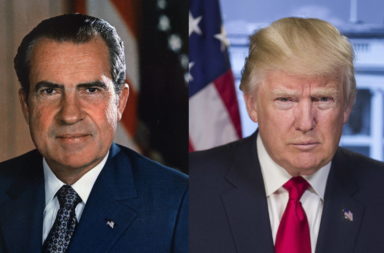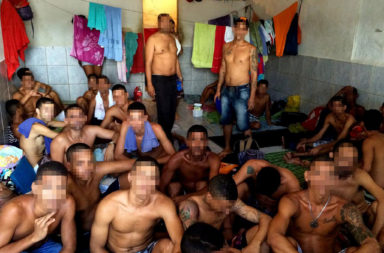Not even ten days went by without scandals after the new government under the interim presidency of Vice-President Michel Temer took office in Brazil. Twelve hours after Ms. Rousseff´s impeachment was confirmed by the Senate, Mr. Temer broadcasted to the nation his willingness to build a national pact to get the needed economic measures approved and to pacify the political tempers of a divided country. While a great share of the population do not recognize Mr. Temer as the legitimate president, claiming that the impeachment was a coup engineered by groups opposed to the Workers Party, his first actions in power are showing much of what is yet to come.
- An “All man´s Land”
In a country where the majority of the population is afro descendant (51%) and female (51%), to say the least, the post-impeachment cabinet is comprised by 22 middle-aged white men from different political parties. Aimed at securing the votes necessary to get the measures approved by the Congress, Mr. Temer argued that his decision was based on pragmatism and that he chose the names that would better fit the government positions. However, many of the names do not have any sort of prior relation to the ministries they rule and were political nominations settled with the parties represented in Congress.
- Setting the (wrong) tone
The lack of coordination in the process of choosing names and setting the tone of the cabinet team showed its first signs days after the inauguration of the new ministers. Mr. Temer empowered parties that comprised the former opposition of Ms. Rousseff´s administration, and the new members of the government made polemic statements regarding programs. The new Health Minister stated that the Public Health System – universal and free of charge since the reestablishment of democracy in Brazil – should be reduced. The Ministry of Education, member of an extreme right wing party, stated that he would be open to the idea of charging for public high education – also free for all in federal institutions. The Ministry of Justice stated that the process of choosing the Attorney General should change, which would represent a greater interference of the president in choosing the person responsible for investigating politicians. Mr. Temer contradicted all of them and they had to draw back in their statements days after they made them.
- Picking a fight with the artists
Willing to show that his administration is committed to reduce the pace of the public debt by cutting public expenditure, Mr. Temer extinguished ten ministries – among them, the Ministry of Culture. A great mobilization of the artistic class and the public opinion pressured for the return of Culture, which was downgraded to a Secretary under the Ministry of Education. Less than one week later, Mr. Temer announced his willingness to recreate the ministry and tried to invite a female minister to increase the representativeness of his cabinet. After more than three invitations were declined by female artists, Mr. Temer decided to appoint a former Brazilian diplomat for the post. Even going back on the decision and recreating the ministry, artists and social movements decided to occupy the regional buildings of the Ministry of Culture in order to stand against his government.
- Targeting social programs
The social programs for housing, scholarships and income transfer, benchmarks of the Workers Party for social inclusion during the last decade, were part of the initial speech of Mr. Temer. Reinforcing their importance to tackle poverty, the interim president warned that they might be target for optimization and improvement. Social movements criticized Mr. Temer willingness to reduce the scope of these programs under the argument that this would increase their efficacy and have been scheduling weekly demonstrations against the government.
- “Let´s stanch this bleeding”
A recording of a conversation ousted by a Brazilian newspaper Folha de São Paulo between the newly appointed Planning Minister Romero Jucá and Sergio Machado, a former president of Transpetro (company linked to Petrobras), revealed a plan to block the corruption investigations currently underway “stanch the bleeding” caused by them. In the recording, made weeks before the impeachment was voted at the lower House, Mr. Jucá states that this pact would be feasible only without Ms. Rousseff in office. This event brought to the core of Mr. Temer´s team accusations of corruption and reinforced the argument that the impeachment procedure was a coup orchestrated by the ones willing to stop the investigations from reaching other political leaders in Congress. Two days later, and less than two weeks as a minister, Mr. Jucá was ousted from his office.
- Picking a fight with the neighbours
In his first action as the Foreign Minister, Mr. José Serra, a leader and former presidential candidate of the PSDB, issued official statements of the Itamaraty (Foreign Ministry´s name) criticizing the statements of Venezuela, Cuba, Bolivia and the Organization of the American States that named the impeachment procedure a breach of democracy in Brazil. Claiming that these actors were interfering on internal issues of the country, Mr. Serra made clear his willingness to change drastically the position of Brazil on the international arena. A great objector of the way that the Workers Party built the international agenda of Brazil, he is already reviewing important points of the foreign policy, focusing more on sewing agreements with the United States and the European Union and changing the focus away from the cooperation with developing countries (such as China, Russia, India and South Africa – the BRICS). In his first official agenda abroad visiting Argentina, Mr. Serra was welcomed by a small group of demonstrators throwing paper balls at him and calling him a “putschist” in front of the Brazilian Embassy in Buenos Aires. Aiming for a presidential candidature in 2018, Mr. Serra will definitely use his post to gain visibility until the presidential race starts.
- An “All Stars” economic team
Although having many turbulences and setbacks in his first weeks, the newly appointed economic team is among the few consensus shared by the market and the different political groups. Ever since Brazilian bonds were downgraded to junk by rating agencies last year, the former President Mr. Lula da Silva himself pressured Ms. Rousseff to appoint Mr. Henrique Meirelles, the former president of the Central Bank under Lula´s term, for the position of Finance Minister. She refused to do so back then, and Mr. Temer took the opportunity to appoint him to his cabinet, giving Mr. Meirelles a carte blanche to appoint any member of his economic team. Mr. Meirelles is said to be the best candidate for the task, but again, the greatest obstacle remains on getting the votes to approve the measures in a fragmented Congress.
Is Mr. Temer ready for the future challenges?
Mr. Temer empowered distinct parties and political leaders thirsty for a share of power in the federal administration in exchange for sewing agreements and making his transitional government successful, at least in meeting the economic challenges. With the municipal elections knocking on the door (October) and the presidential race in two years from now, many politicians are using this opportunity to get their place under the spotlight and capitalize themselves at the pools. Mr. Temer may have the capacity to approve crucial measures, but we should not expect him to control the rebellion that took place in a Congress comprised by 25 distinct political parties. A long lasting solution still depends on a comprehensive political reform that reduces the number of parties while strengthening the rules to avoid candidates under corruption investigations to run for public positions. Ironically, the ones to decide over the political reforms are the same politicians who are to comply with them. In that sense, we should not expect things to get better before the 2018 elections arrive. On the contrary, things can get a lot worse.





